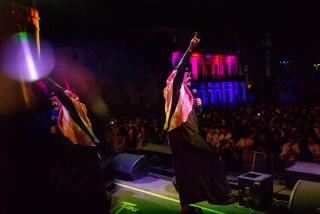In Baghdad, weekly ‘day of rage’ is low-key event
- Share via
Reporting from Baghdad — Maybe it’s the sandstorm that puts a thin crust of brown dust on Baghdad’s Tahrir Square. Or the silver-haired man in a matching suit, gripping a white rose as he tries to shout unsuccessfully through a distorted loudspeaker about politicians. Or the teenager wearing a “Let It Be” T-shirt, with the solemn faces of John, Paul, George and Ringo.
But somehow, Baghdad’s “day of rage” each Friday has slipped into slumber, no longer a thousands-strong protest against the government’s failures. The square resembles a sleepy town where a few hundred people gather for an event because they have nowhere else to go.
In Iraq, things just amble on. In contrast to its neighbors, roiled by the so-called Arab Spring of mass protests, Iraq’s problems stew beneath the surface, from the sectarian tensions that once caused a civil war to an endemic culture of public corruption.
There are deadlines in the future that could still turn Iraq’s protests into something dangerous. But, for now, Tahrir Square, even with a few hundred protesters, resembles its old self: a weed-filled park, famous more recently as a hangout for loiterers, lowlifes, gigolos, glue sniffers and pill poppers.
The two cultures mix this Friday: A dwarf walks through the crowd hawking cigarettes and phone cards; a teenager peddles Arabic coffee from a golden urn; and middle-aged men sit on benches, staring vacantly, as always. The souk across the street, where X-rated films are for sale, does brisk business.
Amid this urban grit, demonstrators chant their slogans against the country’s ruling parties for plundering the public wealth. There are caricatures of Prime Minister Nouri Maliki. Some pose by a black coffin that they say represents the death of Iraq’s Tourism Ministry.
Still, all of it is a lesson in civics. A grizzled, middle-aged man leads a young boy in a suit, busy eating cherry ice cream, to watch the protesters. Soldiers and police, who beat demonstrators in the protests’ early weeks, now look bored, tapping their fingers and counting the minutes until they get the order to leave.
The square — with its smaller, more rakish demonstrations — remains a window on the country’s mind-set and its history. One man carries a framed picture of his brother, Adl, who went missing in 2006 in west Baghdad, when the country was lost in civil war.
“I come to this demonstration every week. I want to protect the rights of my brother,” said Saad Jassem, a Shiite Muslim from east Baghdad’s Sadr City neighborhood. “My brother has a family. A wife and two daughters. They have no money.”
Jassem wants to know what happened to his brother the day he went to the Sunni Arab neighborhood of Amal and disappeared. He wants the government to find out and to take care of his brother’s family, the same way it cares for relatives of political prisoners who died in the late President Saddam Hussein’s prisons.
He hears that his brother was buried with other Shiites in the western farmland on the edge of Baghdad, but says the government is afraid to look there, worried about prowling armed militant groups.
Others talk of the horrors during the time of Hussein’s ruling Baath Party. They recall a serial ax murderer named Abu Tubr, who terrorized Baghdad in the early 1970s. At the time, Iraqis didn’t know what to believe: Was there really was an ax murderer, or was he just a fiction invented by Baathists to cover up political killings?
Eventually, a culprit was arrested. But here in Tahrir Square, a man whispers that Abu Tubr, the Iraqi answer to Jack the Ripper, was never really caught. The man swears a famous Iraqi politician now in government was the real ax murderer.
“I can tell you his name. He is strong and handsome,” he swears, “but will you dare publish it?” He and a friend nod solemnly at their fact. It is another Friday protest in the heart of Baghdad.
Salman is a staff writer in The Times’ Baghdad bureau.
More to Read
Sign up for Essential California
The most important California stories and recommendations in your inbox every morning.
You may occasionally receive promotional content from the Los Angeles Times.













